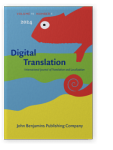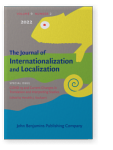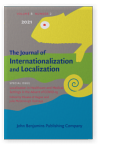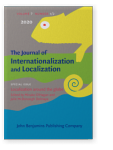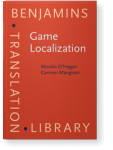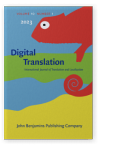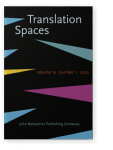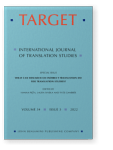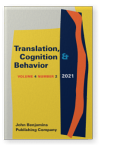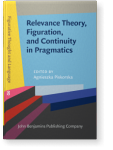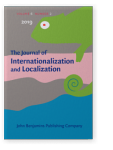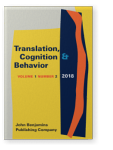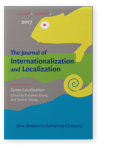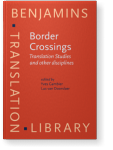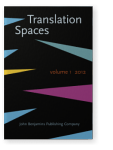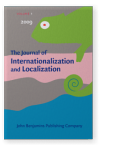Minako O'Hagan
List of John Benjamins publications for which Minako O'Hagan plays a role.
Journals
ISSN 2032-6904 | E-ISSN 2032-6912
Titles
Localization in Healthcare and Medical Settings in the Advent of COVID-19
Edited by Minako O'Hagan and Julie McDonough Dolmaya
Special issue of The Journal of Internationalization and Localization 8:2 (2021) v, 90 pp.
Subjects Communication Studies | Language policy | Translation Studies
Localization around the globe
Edited by Minako O'Hagan and Julie McDonough Dolmaya
Special issue of The Journal of Internationalization and Localization 7:1/2 (2020) v, 137 pp.
Subjects Communication Studies | Language policy | Translation Studies
Game Localization: Translating for the global digital entertainment industry
Minako O'Hagan and Carme Mangiron
[Benjamins Translation Library, 106] 2013. xii, 374 pp.
Subjects Translation Studies
2024 International players’ perceptions of localization in their gameplay experiences: An explorative study with Steam user game reviews Translation Spaces: Online-First Articles | Article
Game localization is the complex industrial process of adapting digital games linguistically, culturally and technically, seeking to deliver a gameplay experience as close as possible to that of the original. Guided by Livingston’s (2018) Review Analysis methodology combined with thematic… read more
2023 Privacy and everyday users of machine translation Translation Spaces 12:1, pp. 21–44 | Article
The concept of privacy is central to technology use, but in machine translation (MT) research the meaning of privacy, and what it represents to everyday MT users, are both often left unquestioned. This article examines user conceptualisations of privacy and their implications for the… read more
2022 Indirect translation in game localization as a method of global circulation of digital artefacts: A socio-economic perspective What can research on indirect translation do for Translation Studies?, Pięta, Hanna, Laura Ivaska and Yves Gambier (eds.), pp. 441–464 | Article
To contribute towards extending the scope of research on indirect translation, this article focuses on game localization as an overlooked site where this translation practice is relatively common. For major games developed in a language other than English (LOTE), the English version (locale) is… read more
2021 Introduction Localization in Healthcare and Medical Settings in the Advent of COVID-19, O'Hagan, Minako and Julie McDonough Dolmaya (eds.), pp. 81–88 | Introduction
2021 The ‘hookability’ of multimodal impact captions: A mixed-methods exploratory study of Japanese TV viewers Translation, Cognition & Behavior 4:2, pp. 253–280 | Article
The use of captions has grown in recent years in both traditional and new media, particularly in terms of the diversity of style, content, and function. Impact captions have emerged as a popular form of captions for hearing viewers and contain rich multimodal information which is employed to… read more
2020 Chapter 7. Relevance, style and multimodality: Typographical features as stylistic devices Relevance Theory, Figuration, and Continuity in Pragmatics, Piskorska, Agnieszka (ed.), pp. 193–226 | Chapter
Brightly coloured textual inserts, which often occupy a sizable part of the TV screen, have become a key feature in Japanese TV. This paper unpacks the contribution of such multimodal stimuli to inference, and the consequences this has for the interpretation process. Using data derived from a… read more
2018 Gamer emotions in laughter: Towards affect-oriented game localisation Translation, Cognition & Behavior 1:2, pp. 299–318 | Article
This study is motivated by the assumption that today’s function-oriented game localisation approach has room for improvement by incorporating an affect-oriented approach. It draws on the concept of “affective framing” in a game with humour as “emotionally competent stimuli”. Laughter as emotion… read more
2017 Seeking delocalization: Fan community and game localization in the age of user empowerment Game Localisation, Zhang, Xiaochun and Samuel Strong (eds.), pp. 183–202 | Article
The continuing development of the Internet and broader technologization have made the presence of game fans and the diverse fan community highly visible, shaping part of contemporary global game culture. The influences of such user empowerment have been debated, notably along the lines of the… read more
2016 Game localization research and translation studies: Loss and gain under an interdisciplinary lens Border Crossings: Translation Studies and other disciplines, Gambier, Yves and Luc van Doorslaer (eds.), pp. 309–330 | Article
Game localization has been largely ignored in game studies and constitutes a
relatively new area of research in translation studies. It is a specialized translation
practice requiring technical, cultural and business considerations specific
to games with multiple stakeholders involved. Addressing a… read more
2012 Translation as the new game in the digital era Translation Spaces 1, pp. 123–141 | Article
Aimed at promoting a broader interdisciplinary discussion, this paper explores translation and entertainment in the context of current and emerging technological trends from a perspective beyond strictly Translation Studies concerns. Taking the case of video games as a rapidly growing modern… read more
2009 Evolution of User-generated Translation: Fansubs, Translation Hacking and Crowdsourcing The Journal of Internationalization and Localization 1, pp. 94–121 | Article
Most conspicuous initially with Japanese anime fansubs, fan-based translation has been developing since the 1980s. In the advent of widespread availability of Web 2.0 platforms, fan translation has become a global phenomenon despite its dubious legal status. Extending the emerging interest in… read more
